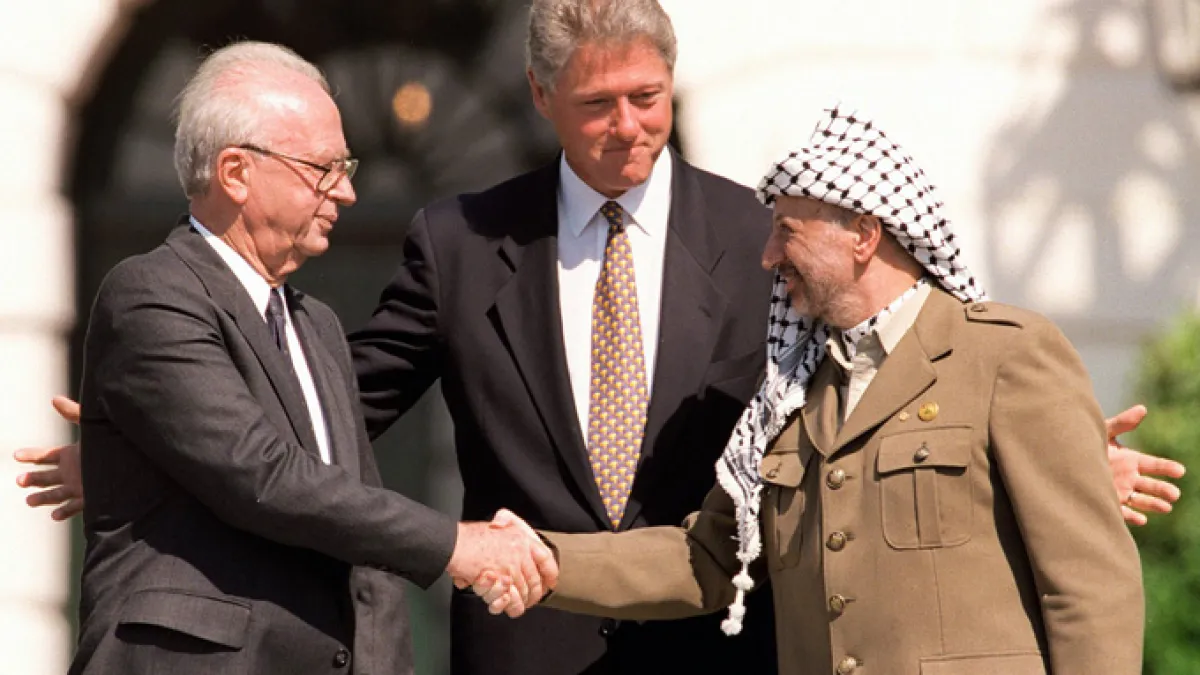Compromised peace? Oslo Accords figure deeply linked to Epstein network | Israel-Palestine conflict
The Norwegian diplomat who was a key architect of the 1993 Oslo Accords is facing a storm of corruption and blackmail allegations after new documents revealed he was deeply embedded in the inner circle of late sex offender and financier Jeffrey Epstein.
Terje Rod-Larsen, a central figure in the Middle East “peace process” in the 1990s, is implicated in newly released United States Justice Department files and Norwegian media investigations that expose a relationship involving illicit loans, visa fraud for sex-trafficked women, and a beneficiary clause in Epstein’s will worth millions of dollars.
The revelations have sent shockwaves through the diplomatic community and led to the resignation of Rod-Larsen’s wife, Mona Juul – herself a pivotal figure in the Oslo negotiations – from her post as Norway’s ambassador to Jordan and Iraq this month. Her security clearance was also revoked.
Palestinian leaders are now questioning whether Oslo’s foundational agreements of the two-state solution were brokered by a mediator vulnerable to elite blackmail and foreign intelligence pressure.
The plan was heralded in the Western world at the time, and in the 30 years since, has been trampled on by successive Israeli governments, with the far-right leadership now openly pushing for annexation of the occupied West Bank.
Investigations by the Norwegian broadcaster NRK and newspaper Dagens Næringsliv (DN) detail how Rod-Larsen used his position as president of the International Peace Institute (IPI) think tank in New York to launder the reputation of Epstein’s associates.
According to the files, Rod-Larsen wrote official letters of recommendation to US authorities to secure visas for young Russian women in Epstein’s orbit, claiming they possessed “extraordinary abilities” suitable for research roles.
In reality, these women were often models with no academic background who were allegedly trafficked and abused by the financier. One victim told NRK she believed Epstein sent her to Rod-Larsen’s institute “to manipulate” her, while another described how the diplomat facilitated her visa after a direct request from Epstein’s assistant.
The transactional nature of the relationship was explicit. Documents show Epstein loaned Rod-Larsen $130,000 in 2013. More damningly, reports indicate that Epstein’s last will and testament included a clause bequeathing $5m each to Rod-Larsen’s two children – a total of $10m.
‘Oslo was a trap’
For Palestinians living under the reality of the failed agreements Rod-Larsen forged, the scandal offers a disturbing explanation for a “peace process” that many believe was rigged.
Mustafa Barghouti, general secretary of the Palestinian National Initiative political party, told Al Jazeera he was “not surprised at all” by the corruption allegations.
“We never felt comfortable with this person from the very first moment,” Barghouti said. “Oslo was a trap … and I have no doubt that Terje Rod-Larsen was being effectively influenced by the Israeli side all along.”
Barghouti argued that the revelation of millions of dollars potentially flowing from a Mossad-linked figure like Epstein to the Rod-Larsen family suggests the corruption was “directed to serve Israel’s interests against the interests of the Palestinian people”.
The ties between the disgraced Epstein and Israel have come into sharp focus after the release of millions of documents.
The documents have revealed more details of Epstein’s interactions with members of the global elite, including former Israeli Prime Minister Ehud Barak. But they also document his funding of Israeli groups, including Friends of the IDF (Israeli army), and the settler organisation the Jewish National Fund, as well as his ties to members of Israel’s overseas intelligence services, the Mossad.
The missing archive
The scandal has reignited calls in Norway to open the “private archive” Rod-Larsen kept regarding the 1993 secret negotiations.
Media investigations have revealed that documents from the critical period between January and September 1993 are missing from the official Foreign Ministry archive. Critics argue these missing files could obscure the extent to which personal leverage or blackmail played a role in the concessions extracted from the Palestinian leadership during the secret talks.
Governing by blackmail
Analysts argue the Rod-Larsen case is symptomatic of a wider system of global governance driven by systematic blackmail and intelligence operations.
Wissam Afifa, a political analyst based in Gaza, drew a parallel between the exploitation of minors on Epstein’s island and the geopolitical treatment of Palestinians.
“We, as Palestinians, were treated as minors … considered as having no right to demand our rights,” Afifa said. “Today we discover that a large part of the international system is essentially ‘Epstein Island’”.
Afifa suggested that the “silence” of the international community regarding the current genocidal war on Gaza could be linked to similar networks of influence and extortion.
“The world was managed from Epstein’s island … in dark rooms,” Afifa added. “We are victims of the influence network that Epstein managed with politicians, leaders and states”.
As Norwegian authorities, including the economic crime unit Okokrim, open investigations into the scandal, the legacy of the diplomat who once shook hands on the White House lawn lies in tatters, casting a long shadow over the history of deeply flawed Middle East peacemaking.
